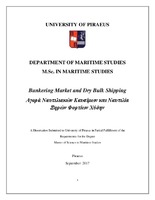Bunkering market and dry bulk shipping
Αγορά ναυτιλιακών καυσίμων και ναυτιλία ξηρών φορτίων χύδην

Προβολή/
Λέξεις κλειδιά
Bunkering ; Fuel consumption ; Dry bulk ; Cargo vessels ; Efficiency ; Confidence ; Stakeholders.Περίληψη
Η σημαντικότητα της κατανάλωσης ναυτιλιακών καυσίμων των πλοίων ξηρού φορτίου χύδην αυξήθηκε κατά τα έτη στην βιομηχανία ξηρού χύδην φορτίου, καθώς τα έσοδα των πλοίων μειώθηκαν απότομα λόγω ορισμένων παραγόντων, κυρίως λόγω της υπερπροσφοράς των πλοίων στην αγορά. Με βάση το συναίσθημα της συλλογικής και ατομικής αγοράς, οι απόψεις ποικίλλουν ως προς το εάν πρόκειται για μια ευκαιρία για επενδύσεις με χαμηλό κόστος που θα αποπληρωθούν σχετικά γρήγορα λόγω της κυκλικότητας της αγοράς ξηρού φορτίου ή για μία περαιτέρω μείωση στην αγορά χρονοναύλωσης και στις τιμές των ναύλων ήδη μειωθεί.
Μέσα στα τελευταία χρόνια εισήλθε στην αγορά ένας μεγάλος αριθμός νεοσύστατων πλοίων και είναι αμφίβολο κατά πόσον η ζήτηση φορτίου θα είναι σε θέση να αντισταθμίσει την αύξηση της προσφοράς πλοίων. Δεδομένου ότι οι υπηρεσίες που αφορούν την αγορά καυσίμων αποτελούν ένα από τα σημαντικότερα τμήματα του παγκόσμιου εμπορίου πετρελαιοειδών, ο στόχος αυτής της διατριβής είναι η ανάλυση του επιπέδου της επίδρασης της οικονομικής απόδοσης στην ανταγωνιστικότητα των φορτηγών πλοίων μεταφοράς χύδην ξηρού φορτίου.
Η ακόλουθη έρευνα εκπληρώθηκε εξετάζοντας τα πρότυπα προσφοράς και ζήτησης με την πάροδο των ετών στη ναυτιλία ξηρού χύδην φορτίου και την επίδρασή της στο κόστος και την κατανάλωση καυσίμων, εξετάζοντας το κόστος ταξιδιού των πλοίων για βέλτιστη οικονομική αποδοτικότητα και τους διάφορους λόγους που προκαλούν διακυμάνσεις της εμπιστοσύνης των ενδιαφερομένων μερών. Η ανάλυση της οικονομικής απόδοσης που σχετίζεται με την κατανάλωση καυσίμων περιλάμβανε τις μεταβολές της εμπιστοσύνης των εμπλεκόμενων φορέων όσον αφορά την αποδοτικότητα των καυσίμων, δεδομένου ότι οι έρευνες έδειξαν ότι η κατανάλωση καυσίμου είναι ζωτικής σημασίας για την οικονομική αποτελεσματικότητα όταν μειώνονται οι τιμές των ναύλων. Διαπιστώθηκε ότι τα πλοία με κορυφαία απόδοση βασισμένα σε πρότυπα αναφοράς, ήταν πιο αποδοτικά στην κατανάλωση καύσιμων από τα πλοία με χαμηλό κόστος αγοράς, δείχνοντας μια άμεση συσχέτιση μεταξύ οικονομικής απόδοσης και κατανάλωσης καυσίμων.
Τα αποτελέσματα υποδεικνύουν επίσης ότι η απασχολησιμότητα των φορτηγών φορτίου χύδην ξηρού φορτίου συνδέεται με την κατανάλωση καυσίμων, καθώς η εμπιστοσύνη των ενδιαφερομένων αντιλαμβάνεται ότι η συγκριτικά μικρότερη κατανάλωση καυσίμων σε σχέση με τα ανταγωνιστικά πλοία είναι ευεργετική. Ωστόσο, δεν μπορεί να ειπωθεί με βεβαιότητα ότι κάθε πιθανό κόστος για την παραγγελία ενός πλοίου το οποίο θα έχει ιδιαίτερα αποδοτική κατανάλωση καυσίμου θα παράσχει τη βέλτιστη επιλογή. Συνολικά, θεωρείται ότι η ενεργειακή απόδοση είναι ο σημαντικότερος παράγοντας για την επίτευξη συγκριτικού πλεονεκτήματος έναντι των ανταγωνιστικών σκαφών.


